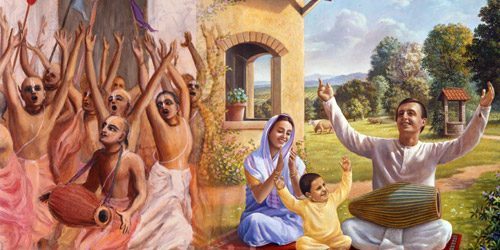Question : My current obstacle is my family of birth, which does not support Krsna Consciousness and does not accept my devotee husband. For some background: I was born into a white Catholic family in America. About 10 months ago I came into Krishna Consciousness and 4 months later married an Indian-bodied devotee. We live in the US, not far from my family. Previous to Krsna consciousness, I was very close with my family, attending all gatherings and regularly spending one-on-one time with individual members. I am no longer attracted to attending these gatherings due to their lack of support of Krsna consciousness and my husband. We have since limited our interactions to only every few months and for only an hour or so, always being sure to bring Prasadam.
Even after only these brief gatherings, though, I notice my Krsna consciousness being affected, finding a resistance in me to performing devotional service. Because of this, I would like to stop interacting with my family and safeguard my Krsna consciousness. However, I am conflicted because this is my family, and it seems I have a duty toward them. I also see these gatherings as a chance to inspire those members who have fallen away from Catholicism to take up a bonafide spiritual path. Please advise me as to if/how I should interact with my family.
Answer by Romapada Swami :
You are certainly doing the right thing in showing some reserve towards those who do not support your devotional path. At this stage, it is of foremost importance to protect the tender creeper of your devotion from anything that might threaten it.
Likewise, in the interest of protecting your grihastha-ashrama (Krishna-conscious marriage), it is healthy for you to not associate *closely* with those who don’t nurture your loving relationship with your husband. That can prove highly detrimental. Please refer to the very instructive example of Sati from the Bhagavatam. (SB Canto 4 Chapters 2–4)
You need not alienate yourself from your family completely, either, as long as they do not purposefully blaspheme devotees. Continue to maintain a warm disposition towards them, from a healthy distance for the present. If it is straining for you, take your time, and extend yourself within your comfort level, so it does not disturb your own devotion. But in any interaction with them, even if few and far between, exhibit the qualities of genuine Krishna consciousness, viz. being very gentle, caring, humble and non-confrontational, but at the same time not budging from or compromising your higher convictions.
Their initial coldness and discomfort with your new way of life will subsides with the passage of time. By then, the qualities you consistently exhibit will soften and warm their hearts; and in all likelihood they will begin to appreciate, or at least feel comfortable, with your husband and the principles you conduct your life by. In the meanwhile, your own devotional strength will have become stronger, and you will not be disturbed or dissuaded by their ways.
It may be a little difficult emotionally for you, for the time being. But in the long run, you will realize the wisdom of this course of action.
By your undeviating focus in the devotional process, you are automatically fulfilling your duty towards your family, regardless of whether you share it with them in tangible, outward gestures or not. By your watering the root of the tree, they will automatically receive the benefit. When one becomes purely devoted to Krishna, not only their immediate family but seven generation before and after become delivered by Krishna! This is the amazing potency of Krishna consciousness. It is wonderful if you can share with them the gifts you have received and inspire them, and the more you become steady in your devotion, the more you will be empowered to help them. But if it affects you, then better to step back; trust that Krishna will make the best possible arrangement for their progress.







